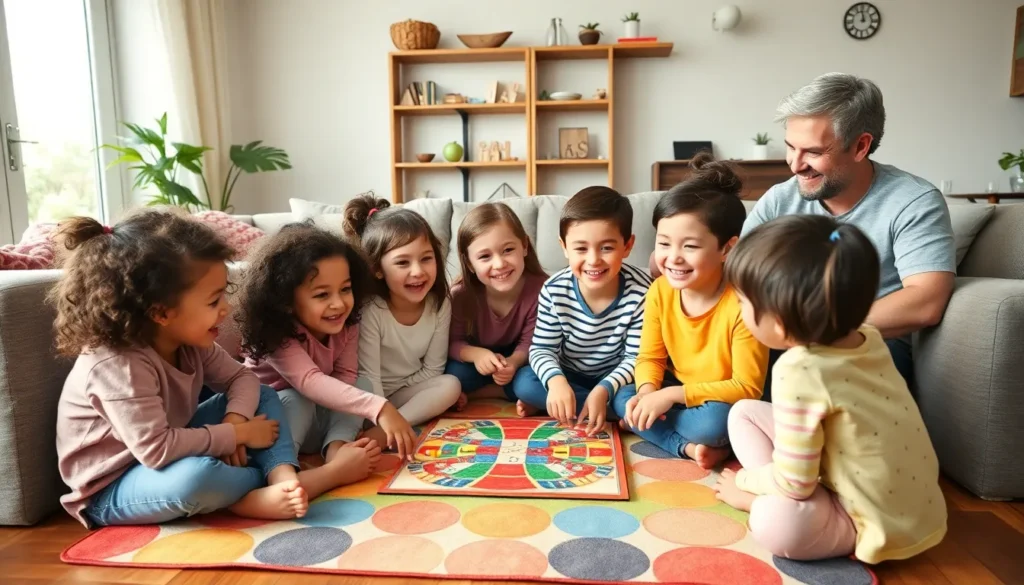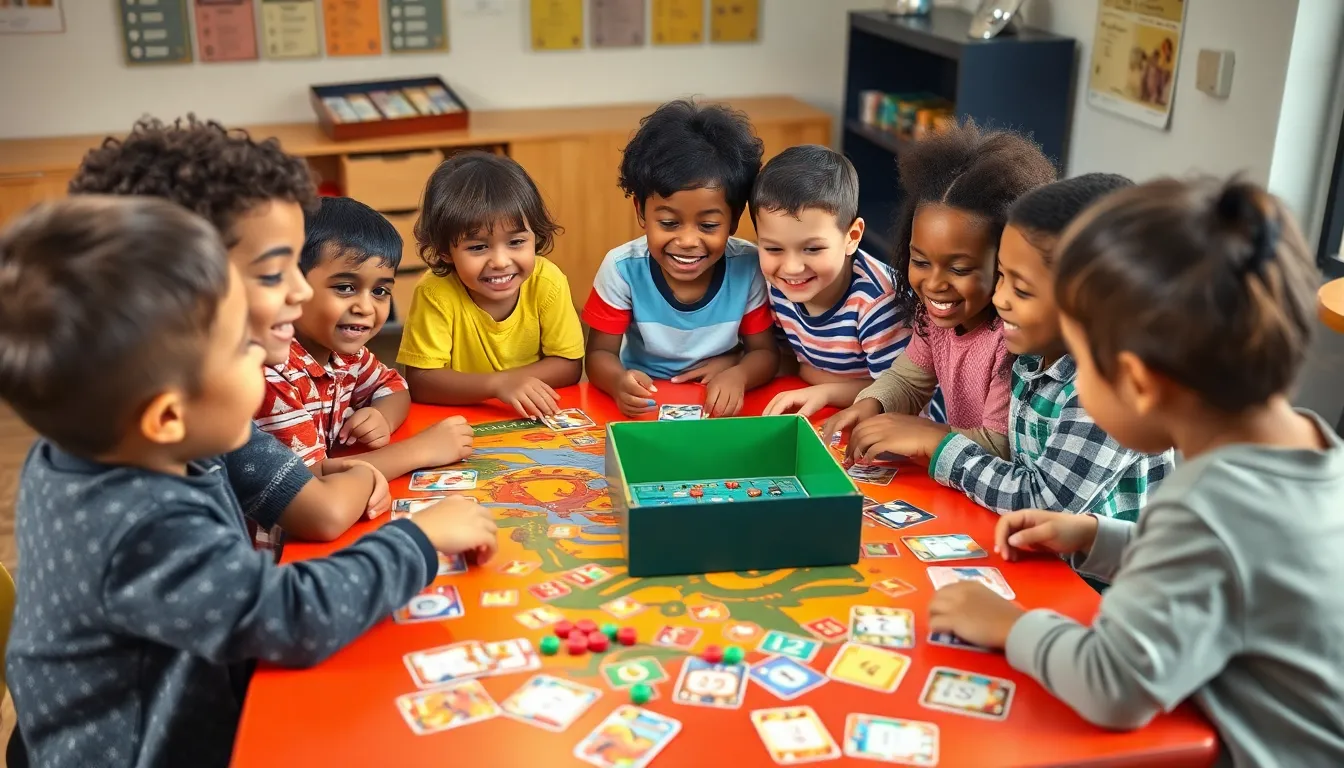Table of Contents
ToggleGames aren’t just for fun anymore—they’re powerful educational tools that parents can leverage to boost their children’s learning journey. When kids engage with educational games, they’re actually developing critical thinking skills, problem-solving abilities, and knowledge retention without even realizing it.
FParentTips brings you the best strategies to transform playtime into valuable learning experiences. From digital apps to traditional board games, there’s an endless variety of options that cater to different ages, subjects, and learning styles. These game-based approaches make education feel less like a chore and more like an adventure that both parents and children can enjoy together.
Why Games Are Powerful Learning Tools for Children
Games transform learning from a passive experience into an interactive adventure that captivates children’s attention. Research from the Journal of Educational Psychology shows that game-based learning increases knowledge retention by 40% compared to traditional methods. Children naturally engage with educational content when it’s presented through play rather than formal instruction.
Educational games create motivation through achievement systems like points, levels, and rewards that make learning addictive. These rewards trigger dopamine release in the brain, reinforcing positive associations with learning activities. Kids willingly tackle challenging concepts when embedded within game mechanics they enjoy.
Games also develop crucial 21st-century skills including:
- Critical thinking through puzzles and strategy games that require analysis and planning
- Collaboration via multiplayer experiences where communication becomes essential
- Adaptability as children learn to respond to changing game conditions and rules
- Digital literacy through technology-based educational games and apps
The hands-on nature of games provides immediate feedback, allowing children to learn from mistakes without the stigma of failure. This creates a psychologically safe environment where experimentation leads to deeper understanding. Unlike traditional homework, games encourage multiple attempts at solving problems.
According to cognitive development expert Dr. Laura Schulz, “Play isn’t just fun—it’s nature’s learning engine.” Games leverage this natural learning process by engaging multiple senses simultaneously, creating stronger neural pathways for information retention. The emotional engagement that accompanies gameplay anchors concepts in long-term memory more effectively than passive reading or listening.
Types of Educational Games That Enhance Learning
Educational games come in various formats, each offering unique benefits for children’s cognitive development. These engaging tools transform traditional learning methods into interactive experiences that cater to different learning styles and educational objectives.
Digital Learning Apps and Games
Digital educational games have revolutionized learning with their interactive and immersive environments. Apps like Khan Academy Kids, ABCmouse, and Prodigy Math Game blend curriculum-aligned content with colorful animations and game mechanics that keep children engaged. Puzzle games such as Lumosity develop problem-solving skills through increasingly complex challenges. STEM-focused options like Tynker and Scratch introduce coding concepts through visual programming interfaces where kids create their own games and animations. Language learning apps including Duolingo and Endless Alphabet incorporate spaced repetition and gamification elements that make vocabulary acquisition feel like play rather than work. These digital tools excel at providing personalized learning paths that adapt to each child’s progress and automatically adjust difficulty levels to maintain an optimal challenge zone.
Traditional Board and Card Games
Traditional games offer tangible learning experiences that digital alternatives can’t replicate. Classics like Scrabble and Boggle strengthen vocabulary and spelling skills through competitive word formation. Math-centered games such as Monopoly and PayDay introduce financial literacy concepts including budgeting, counting, and strategic planning. Strategy games like Chess and Checkers develop critical thinking and forward planning abilities that transfer to academic problem-solving. Educational card games including Uno and Sequence reinforce pattern recognition and numerical sequencing. Memory games like Simon and traditional matching card games enhance recall abilities and concentration. These hands-on experiences create valuable opportunities for face-to-face interaction, teaching children important social skills including taking turns, following rules, and practicing good sportsmanship—all while strengthening family bonds through shared activities.
How Games Develop Different Skills in Children
Educational games serve as powerful developmental tools, enhancing various skills in children through engaging play experiences. These interactive activities stimulate different areas of brain development while making the learning process enjoyable and memorable for young minds.
Cognitive Development Through Gaming
Games significantly boost children’s cognitive abilities by challenging their thinking processes in enjoyable ways. Puzzle games like Sudoku and Rush Hour enhance logical reasoning and spatial awareness as children manipulate pieces to solve complex problems. Strategy-based games such as Chess and Settlers of Catan strengthen critical thinking and planning skills, requiring players to anticipate consequences several moves ahead. Memory games including Concentration and Simon improve retention capabilities and information processing speed. Educational apps like Lumosity and Brain Pop incorporate elements that strengthen attention span and concentration through targeted cognitive exercises. Research from the American Academy of Pediatrics indicates that children who regularly engage with problem-solving games score 12% higher on cognitive assessment tests compared to their peers who don’t play such games.
Social and Emotional Learning Through Play
Multiplayer games create natural environments for children to develop crucial social and emotional competencies. Cooperative games like Pandemic and Forbidden Island teach teamwork and communication as players must collaborate to achieve common goals. Role-playing games help children practice empathy by encouraging them to understand different perspectives and motivations. Games with competitive elements teach emotional regulation, helping children manage feelings of disappointment and celebrate achievements appropriately. Board games like Monopoly and The Game of Life provide opportunities for practicing turn-taking, patience, and respectful interaction. Children who regularly engage in social gaming demonstrate improved conflict resolution skills in real-world situations. Pretend play activities enhance emotional vocabulary, allowing children to express and identify feelings more effectively. Educational psychologists have observed that regular participation in structured group games can reduce social anxiety by 30% in shy or reserved children.
Parent’s Guide to Choosing Educational Games
Selecting the right educational games for children involves understanding developmental needs and learning objectives. Parents face unique challenges when navigating the vast market of games claiming educational benefits, requiring thoughtful consideration of several key factors.
Age-Appropriate Game Selection
Age-appropriate educational games match a child’s developmental stage and capabilities while challenging them just enough to promote growth. For preschoolers (ages 2-5), simple memory games, basic puzzles, and colorful matching activities help develop recognition skills and hand-eye coordination. Elementary-aged children (6-10) benefit from games featuring reading comprehension, basic math concepts, and logical reasoning like Scrabble Junior or Math Bingo. Tweens and teens (11+) engage more deeply with strategy games, complex puzzles, and simulation games that incorporate advanced concepts in science, history, or economics.
Research from the National Association for the Education of Young Children shows that children learn most effectively when activities align with their developmental readiness. Parents should examine game packaging for age recommendations but also consider their child’s individual abilities, interests, and learning pace when making selections.
Balancing Entertainment and Educational Value
Educational games must strike a balance between fun gameplay and meaningful learning opportunities to maintain children’s engagement. High-quality educational games disguise learning elements within entertaining mechanics, creating experiences where children eagerly participate without realizing they’re developing skills. Parents can evaluate this balance by observing their child’s enthusiasm during play alongside the educational concepts being reinforced.
Games like Minecraft Education Edition exemplify this balance by teaching coding, design, and resource management through an immersive building environment that captivates players. Traditional options such as Ticket to Ride combine geography lessons with strategic thinking in a competitive format that families enjoy together. The American Academy of Pediatrics notes that children retain information 30% more effectively when learning occurs during pleasurable activities. Parents should rotate games regularly to keep content fresh and watch for signs that a game has become too simplistic or overly frustrating, adjusting choices as their child’s abilities evolve.
Incorporating Games into Your Family Routine
Establishing consistent game time strengthens family bonds while enhancing children’s educational development. Designating specific periods during the week—like “Family Game Friday” or weekend afternoon sessions—creates predictable learning opportunities that children eagerly anticipate. These regular gaming sessions transform ordinary family time into enriching experiences where cognitive and social skills flourish naturally.
Morning routines benefit from quick educational games that jumpstart children’s brains before school. Simple math challenges during breakfast or vocabulary games during the commute turn otherwise mundane moments into opportunities for mental stimulation. Families find that incorporating 15-minute game sessions before bedtime helps children wind down while reinforcing concepts learned throughout the day.
Digital integration works effectively when parents establish clear boundaries around screen time. Educational apps can be strategically incorporated during waiting periods—doctor’s appointments, car rides, or before dinner—making productive use of transition times. Many families implement a “learn first, play later” approach where children earn recreational game time after completing educational game challenges.
Seasonal themes keep game routines fresh and engaging throughout the year. Holiday-themed math games during winter, nature exploration challenges in spring, and outdoor learning activities in summer prevent routine fatigue. Parents who rotate their game collection monthly report 30% higher sustained interest from their children compared to those who maintain the same games indefinitely.
The kitchen transforms into a powerful learning space when cooking activities incorporate measurement games and scientific principles. Outdoor family walks become scavenger hunts that teach observational skills and natural science concepts. Even household chores evolve into engaging learning experiences when framed as beat-the-clock challenges or sorting games that develop organizational abilities.
Setting Healthy Gaming Boundaries
Gaming boundaries create a structured environment where children can enjoy educational games while maintaining a balanced lifestyle. Parents establish these limits to ensure gaming enhances rather than detracts from a child’s development. Clear time limitations prevent excessive screen exposure, with experts recommending no more than 1-2 hours of daily gaming for school-aged children.
Content restrictions matter significantly when selecting games. Parents should check age ratings and content warnings before allowing children access to new games. Many platforms offer parental controls that filter inappropriate content and limit purchases, preventing unexpected charges on connected payment methods.
Physical gaming spaces also require boundaries. Designating specific areas for gaming keeps technology out of bedrooms where it can interfere with sleep patterns. Studies show that using screens before bedtime reduces melatonin production by up to 22%, making it harder for children to fall asleep.
Monitoring without hovering creates an effective balance. Parents can stay informed about their child’s gaming activities through regular check-ins and occasional co-play sessions. This approach builds trust while ensuring safety, as children feel supported rather than scrutinized.
Consistency across caregivers strengthens boundary effectiveness. When parents, grandparents, and other guardians enforce the same rules, children understand expectations clearly. A family media agreement, signed by all household members, formalizes these boundaries and prevents arguments about gaming privileges.
Natural consequences for boundary violations teach responsibility. Temporary gaming privileges suspension works better than punishments unrelated to the infraction. For example, if a child plays beyond their allotted time, they might lose gaming access for the following day rather than missing an unrelated activity.
Joining the Play: The Parent’s Role in Game-Based Learning
Parents transform educational gaming from a passive activity to a rich learning experience through active participation. Their involvement creates opportunities for deeper learning connections and meaningful interactions that enhance the educational value of games. Research from the Journal of Educational Psychology shows that parent-guided gaming sessions increase knowledge retention by 27% compared to solo play.
Active participation doesn’t mean taking over—instead, parents serve as facilitators who ask thoughtful questions and guide discoveries. During math games, a simple prompt like “Why did you choose that strategy?” encourages critical thinking and metacognition. Parents also function as learning bridges by connecting game concepts to real-world applications, helping children transfer knowledge beyond the gaming environment.
Modeling positive gaming behaviors demonstrates important skills such as perseverance, strategic thinking, and good sportsmanship. Children naturally mimic these behaviors when they observe parents displaying grace in defeat or celebrating others’ successes. Expressing genuine enthusiasm about learning discoveries within games—whether it’s identifying patterns in Sequence or calculating probability in Yahtzee—reinforces the value of educational content.
The most effective approach involves balancing guidance with autonomy. Educational psychologist Dr. Maryellen Weimer notes that “productive struggle leads to deeper understanding,” so allowing children to work through challenges independently before offering support maximizes learning benefits. Parents can observe first, then ask targeted questions that lead children to discover solutions on their own.
Regular reflection conversations after gameplay cement the learning experience. Simple questions like “What new skills did you practice today?” or “How might you use that strategy differently next time?” encourage children to process and internalize their learning, creating cognitive connections that strengthen retention and application in diverse contexts.
Conclusion
Games offer an unparalleled opportunity for children to learn while having fun. By incorporating educational games into family routines parents can foster critical thinking problem-solving and social skills that prepare kids for future success. The balance between digital and traditional games provides diverse learning experiences that appeal to different learning styles and developmental stages.
Setting healthy boundaries ensures that game-based learning remains beneficial while active parental involvement maximizes educational outcomes. When parents engage thoughtfully with their children during gameplay they create powerful learning moments that build stronger family connections.
Educational games aren’t just entertaining distractions—they’re valuable tools that transform learning into an adventure. With FParentTips strategies families can harness the full potential of games to nurture well-rounded confident learners who approach challenges with enthusiasm and creativity.








